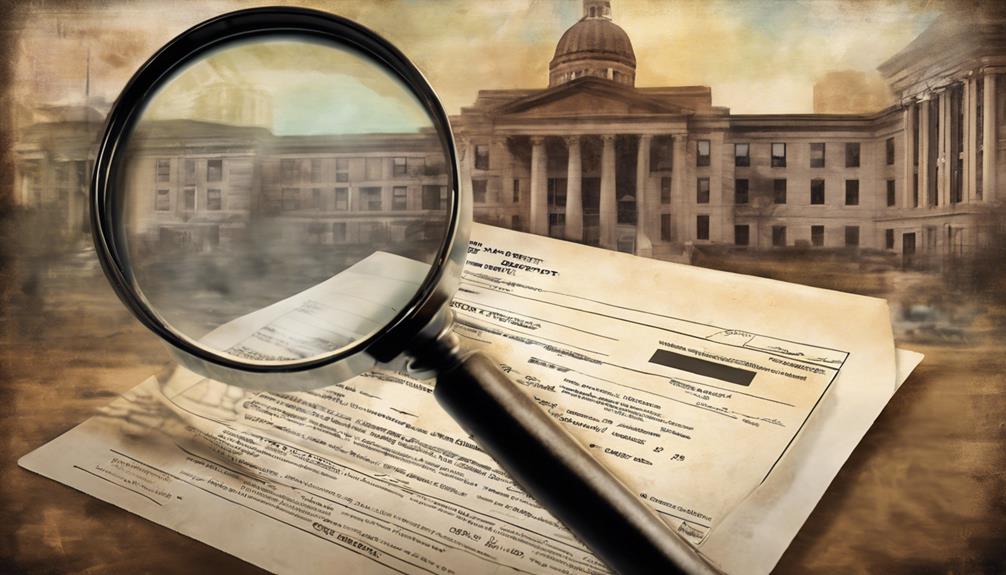Different types of background checks include criminal screenings for considering risks, employment checks to confirm suitability, tenant screenings for selecting responsible tenants, childcare checks for worker reliability, and gun sales verifications for firearm eligibility. Each type serves a distinct purpose, ensuring safety and compliance in various settings.
Key Takeaways
- Criminal Background Checks aid employers in evaluating risks for sensitive positions.
- Employment Screening includes criminal records, references, SSN verification, and education authentication.
- Tenant Screening involves reviewing criminal records, credit reports, and references for responsible tenants.
- Childcare Background Checks include criminal, fingerprint, abuse/neglect, and sex offender screenings.
- Gun Sales Background Checks regulate firearm purchases through the NICS to enhance public safety.
Criminal Background Checks

Criminal background checks reveal an individual's criminal history from various databases, aiding employers in evaluating potential risks for sensitive positions. These examinations explore national databases, uncovering details such as convictions, arrests, or warrants. By examining an applicant's criminal history, employers can make informed hiring decisions, gauging the level of risk associated with the candidate.
The records obtained through these checks play a vital role in ensuring a safe work environment, especially in roles involving security, financial responsibilities, or interactions with vulnerable populations.
Moreover, criminal background checks are necessary for compliance with legal requirements, as the information gathered can vary based on state laws and the specific databases searched. This process allows employers to mitigate potential risks associated with hiring individuals who've a criminal history, safeguarding the organization and its employees.
Employment Screening
Employment screening encompasses various checks, including criminal record, character references, SSN verification, and education authentication. Employers conduct these checks to confirm that potential employees are suitable for the job and don't pose any risks to the company.
In addition to the standard screenings, some employers may also include credit checks or focus on specific screenings like checking for sex offenses, especially for roles involving vulnerable populations. Validating work history is another critical aspect of employment screening, as it helps employers verify the accuracy of the information provided by the candidate.
Education validation ensures that the candidate possesses the necessary qualifications for the job. Running a background check on oneself before applying for a job can help individuals anticipate any issues that may arise during the screening process, allowing them to address any discrepancies beforehand.
Employment screening is an important process for employers to make informed hiring decisions and maintain a secure work environment.
Tenant Screening

Tenant screening is an important process for landlords to evaluate potential tenants and safeguard their properties. This significant step involves reviewing criminal records, credit reports, and references to guarantee that responsible tenants are selected.
By conducting tenant screenings, landlords can make informed decisions about who they allow to rent their properties, evaluating the financial responsibility and reliability of applicants. Tenant screening is a common practice in the rental industry, benefiting property owners by helping them select tenants who'll maintain the property well.
This process is essential to property management, as it assists landlords in choosing tenants who are more likely to fulfill their lease obligations and care for the rental unit appropriately. Overall, tenant screening plays a crucial role in ensuring a positive and secure rental experience for both landlords and tenants.
Childcare Background Checks
Childcare background checks are thorough screenings conducted for individuals working in the childcare industry to guarantee the safety of children in their care. State regulations dictate the specific requirements for these screenings, which commonly include criminal background checks, fingerprint checks, abuse/neglect list checks, and sex offender registry checks.
Ensuring that childcare providers undergo these extensive screenings is essential for maintaining the safety and well-being of children under their supervision. Parents are advised to conduct background checks on potential childcare providers to make informed decisions regarding who they entrust with their children.
Gun Sales Background Checks

Background checks play an essential role in regulating the purchase of firearms, specifically through the required gun sales background checks under the Brady Handgun Violence Prevention Act. These checks are facilitated by the National Instant Criminal Background Check System (NICS) operated by the FBI, ensuring that individuals seeking to purchase firearms are legally eligible to do so. By conducting these background checks, public safety is enhanced, and the aim is to prevent firearms from ending up in the wrong hands. This process is integral in upholding gun control laws and maintaining the eligibility standards for owning firearms in the United States.
| Key Points | Details |
|---|---|
| Legislation | Brady Handgun Violence Prevention Act |
| System Used for Checks | National Instant Criminal Background Check System (NICS) |
| Agency Responsible | Federal Bureau of Investigation (FBI) |
| Purpose | Verify eligibility of individuals to purchase firearms |
| Importance | Enhance public safety and prevent unauthorized gun ownership |
Frequently Asked Questions
What Is the Most Common Type of Background Check?
The most common type of background check is the criminal background check. It scans national, state, and local databases for arrests, convictions, and court records. Employers use these checks to assess potential risks in sensitive positions.
What Typically Shows up on a Background Check?
What typically shows up on a background check? Criminal history, employment verification, education confirmation, reference insights, drug screening results, driving record checks, professional license confirmation, and social security number verification are common components found in background checks.
What Is a Red Flag on a Background Check?
A red flag on a background check often indicates issues like criminal records, employment gaps, poor credit history, false credentials, or inaccurate information provided by the candidate. Employers consider these factors suspicious during the screening process.
What Is the Best Background Check for Employers?
When employers seek the best background check, they prioritize identity verification, criminal record checks, employment history, education verification, and professional license confirmation. These checks help make informed hiring decisions, ensuring a reliable and compliant workforce.
Conclusion
To sum up, background checks play a vital role in various aspects of our lives, from employment to safety. According to a recent study, 72% of employers conduct background checks on potential employees. This statistic highlights the significance of thorough screening processes in ensuring the safety and security of individuals and organizations.
Remember, background checks are a valuable tool in making informed decisions and promoting a safe environment for everyone.









